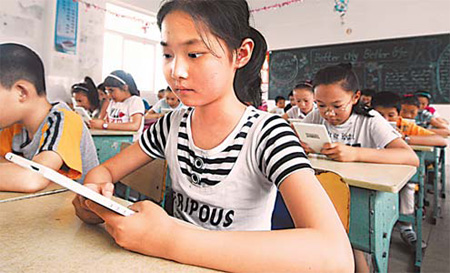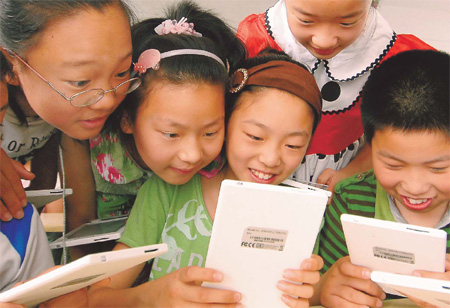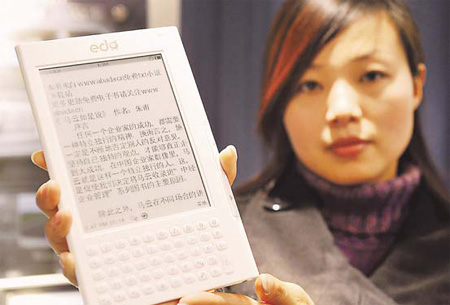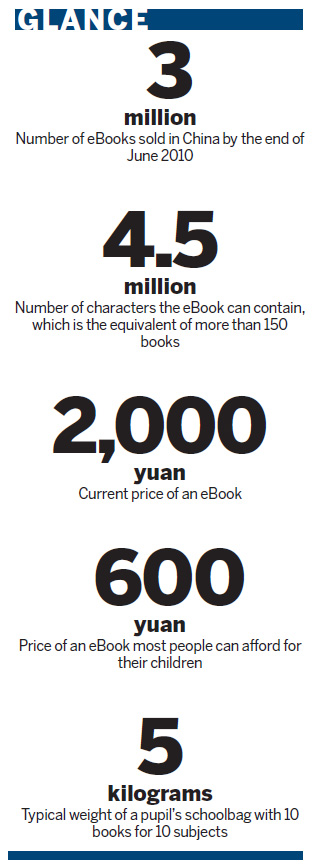 |
Large Medium Small |
|
 Students at one class in Yangzhou Sanyuanqiao Elementary School are the first to use eBooks in the Chinese mainland. Zhao Jun / for China Daily
|
While eBooks lighten the load of backpacks and save trees, they still need some adjustments before becoming replacements for paper textbooks. Peng Yining reports from Yangzhou.
Twelve-year-old Tang Yin is one of the earliest students to test a digital textbook in China. The boy said he was a little disappointed when he received the monochromatic flat device in April this year, because he thought it should be a "super cool" laptop. But Tang still cherishes his new equipment like "protecting my eye," said the fifth grader. After all, not every student has the opportunity to use the eBook, which is worth 2,000 yuan ($294), he said.
The 50 eBooks, donated by Taiwan eBook manufacturer Chuanqi Photoelectric Technology in Yangzhou, Jiangsu province, enables one class at Yangzhou Sanyuanqiao Elementary School to be the first group of students in the Chinese mainland to replace their regular textbooks with electronic ones. Out of 1,000 students, Tang's class was the lucky recipients.
"Our school could not afford the project without the company's donation," said Yuan Shishan, vice-headmaster of the primary school. Although the digital book is considered environmentally friendly, because it replaces paper books, and saves money in the long run, the price is much higher than most Chinese families can afford. Also, some technical defects, the inconvenience of taking notes and monochromatic display, make the eBook fail to meet the expectations of students and teachers.
"There's still a long way to go before the eBook really plays an important role in education," said the headmaster.
According to Yuan, the annual average income of a local family in Yangzhou is about 20,000 to 30,000 yuan, and neither the parents nor the school can afford the 2,000 yuan digital textbook.
During class breaks, children who aren't in Tang's class crowd around the windows of Tang's classroom, staring at the new gadget with admiration. "Sometimes I let them have a touch before I hand the eBook in," said Tang Yin.
The school doesn't allow the students to take their eBooks to their homes. The devices are handed in after class, and are locked in the headmaster's office.
"Fifty eBooks are worth nearly 100,000 yuan. They're the most valuable property in our school," said Yuan. "We can't take the risk that a child might break the device or lose it. Besides, we don't have money to buy replacements."
At Tongxin School, a school for migrant workers' children in Yangzhou, more than 1,000 primary pupils and junior high school students compete to grab four digital textbooks donated by eBook manufacturer Yangzhou EDO Technologies.
"Our students' parents are migrant workers, disabled people and rag pickers. It's difficult already for them to feed their family and save 360 yuan to send their children to our school for a semester," said Wan Lijuan, a math teacher and assistant headmaster of Tongxin School. "The company's donation gives students a chance to use the electronic studying equipment but they are too expensive to replace the physical textbook."
The company donated six eBooks, two of which are used by teachers. The other four are used by students who receive the highest score in the final examination this semester.
"Children are very excited about the reward. I've never seen them work so hard before," Wan said. But even the top four students will not own the devices. Each of them will share the eBook with other students and also won't be allowed to take it home, to avoid it getting broken or lost when a student moves or drops out due to the family's poverty, which frequently happens in the school.
"The students from poor families have little access to digital learning equipment, although people all claim we are in the digital age," the teacher said.
eBooks catching on
In 2010, the sales of eBooks rocketed to three million in China, from 900,000 in 2009, according to a report from the General Administration of Press and Publication of China, which announced on July 7 an eBook project.
Yangzhou, a city once famous for block printing in the Tang Dynasty (AD618-907), now has become one of the world's biggest manufacturing bases of E-ink, which is electronic "ink" used on the eBook.
"The textbook market will be our target in the future, but not now," said Li Bailu, vice president of EDO. The company's three best sellers are worth 1,600, 2,000 and 3,000 yuan, according to Li, so most of its customers are white collars in developed areas.
"The eBook won't be accepted in schools unless its price reduces to 500 to 600 yuan," said Li. "The market in schools is surely huge, but we can't cut the cost, and we can't always donate the device to schools.
|
 Tang Yin, right, reads a digital textbook with his classmates at the Sanyuanqiao Elementary School in Yangzhou, Jiangsu province. Tang and his classmates are the first group of students on the Chinese mainland to have their regular textbooks replaced by electronic ones. Zhao Jun / for China Daily
|
During the nine-year compulsory education (six years for primary school and three years for junior high school), the textbooks are all free. "So I have no reason to pay 2,000 for an eBook," said She Yaqin, Tang's Chinese teacher, and also his mother. "As his teacher and mother, I won't buy my son a digital book. It's not only because of the high price, but also because of the technical defects."
The biggest problem is the inconvenience of taking notes, she said. The devices they are using don't have the function that enables the user to write on the screen.
"Taking notes is a part of study. Pupils especially need to practice how to write the characters," said the 36-year-old teacher who has been teaching Chinese for 17 years.
Textbooks return to the classroom for students to be able to take notes. Students read on the digital book and write or sketch on the paper one.
"No convenience at all. It slows down the teaching progress," said She.
She also complained about the slow reaction of the device, which pauses at every page turn, and the six-inch screen. "It's too small," she said. "It's called the eBook, so it should be at least as big as a real book."
The eBook is used in three subjects: Chinese, math and English. Because of the inconvenience, the digital device is used in only 10 percent of the lessons in those three subjects. "The eBook is usually used in reading courses in Chinese class," said She. "I am satisfied that the digital device is able to save more reading material than physical books, but its monochromatic display is not attractive to children as much as the colorful traditional textbooks."
Li, the vice president of the eBook manufacturer, said the problem will be solved as technology develops, but with higher cost. She showed a new product of her company, which enables users to write on the screen. The price is 3,300 yuan. The colorful display and bigger screen also can be manufactured but with higher cost.
"The government strictly limits the price of textbooks, so it is unlikely that expensive digital formats will replace a huge amount of textbooks in a short time," said Zhen Qiang, assistant to the editor-in-chief of Foreign Language Teaching and Researching Press, one of the biggest textbook publishers in China.
Obstacles remain
Obstacles include immature and expensive technology and user resistance, according to Zhen.
"I believe the textbook will be one of the last publications impacted by digital innovation. The large scale replacements won't trigger until most people accept and use electronic reading devices."
But Zhen also believes the transformation from physical books to digital books is the trend in the long run. He said the Foreign Language Teaching and Researching Press has been talking with eBook manufacturers about cooperating, but they have not yet reached an agreement.
"The eBook market is still developing," he said. "It is premature to take any actions now."
Although the process of replacing paper books might be slow and difficult, it's still worth a try, Yuan said. Some 230,000 pupils in Yangzhou will use more than 2.55 million textbooks each year. "How much wood will be consumed?" he said.
The headmaster also advocates recycling old textbooks. At Sanyuanqiao Elementary School, public textbooks are used in music and arts classes.
"Digital books and public books are not only environmental friendly, but also reduce the weight of school bags," Yuan said.
|
 A staff member of Yangzhou EDO Technologies shows the company's latest product - a seven-mm thick eBook, which is believed to be the third generation of its kind. Provided for China Daily
|
"I am asking my parents to buy me a trolley," said the skinny little girl.
The faculty hope the eBook, which can contain the equivalent of more than 150 books, or 4.5 million characters, would help the students get rid of their big bundles. But to take notes, the student still has to bring the physical books to school. Only one textbook in the reading course is replaced by the digital reader.
"The electronic book might save money in the long run," said Zhao Meilan, a 37-year-old mother whose daughter is using the donated eBook. She said every year she spends more than 300 yuan to buy her daughter books, including exercise books and reading materials.
"If the device is cheaper than 600 yuan and could be used for more than five years, it would be acceptable for me," said the mother, whose annual income is 20,000 to 30,000 yuan.
Zhao's daughter, 12-year-old Gao Chenxuan, said she always looks forward to using the electronic book in class.
"It's new, and more interesting than the physical books," said the girl. "It's also very easy to operate. It only took me half an hour to learn how to use it."
Tang, Gao's classmate, said he has been playing with a computer since the age of 6, and became a big fan of Warcraft, a famous computer game. The eBook is like another digital toy for the young computer literate.
"I was first excited to use the digital reader, but after a few months, I found it was as boring as the physical books," the boy said with a laugh. "My head aches when I read the text and math formulas, no matter if they are printed on paper or on screen."
"The younger generation is more accepting of new ideas and technologies, and I believe the digital reading will go mainstream," said Tian Tongsheng, an expert from the China Educational Technology Association. Besides Yangzhou, schools in Shanghai and Yiwu in Zhejiang province are also planning to promote digital reading.
"As the technology develops, the function of the eBook will be more and more powerful," Tian said. "But the most important function is to help teaching and studying. If the device could solve some of the education problems bothering teachers and students, it could be a real asset in the classroom."
